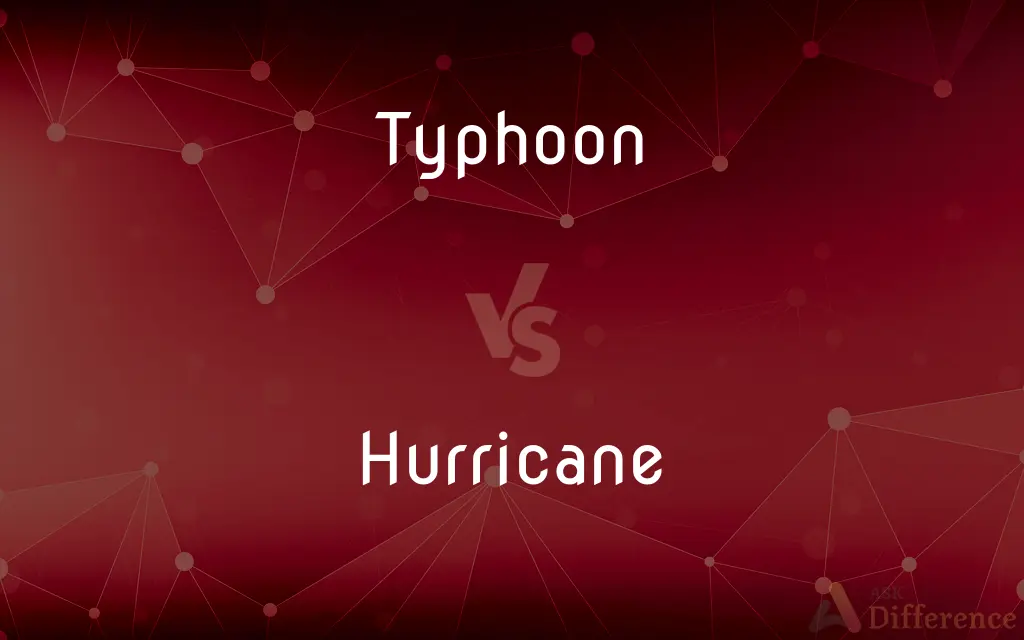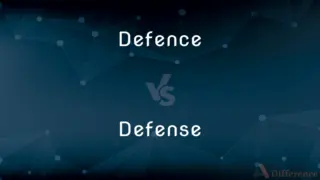Typhoon vs. Hurricane — What's the Difference?
By Tayyaba Rehman — Updated on October 3, 2023
Typhoon is a tropical cyclone occurring in the Northwest Pacific. Hurricane is a tropical cyclone occurring in the Atlantic and Northeast Pacific.

Difference Between Typhoon and Hurricane
Table of Contents
ADVERTISEMENT
Key Differences
Typhoons and Hurricanes both represent intense tropical cyclones, synonymous in nature but differentiated by their geographical occurrences. While Typhoons predominantly transpire in the Northwest Pacific Ocean, west of the dateline, Hurricanes are identified in the Atlantic Ocean and Northeast Pacific Ocean.
A Typhoon escalates from a tropical depression into a formidable storm, characterized by powerful winds and torrential rain, impacting countries like Japan, China, and the Philippines. In contrast, a Hurricane, while similarly evolving from a tropical depression, generally impacts regions such as the Caribbean, the United States, and Mexico, delivering similar atmospheric disturbances.
Both Typhoons and Hurricanes are meticulously tracked by meteorological agencies, employing satellites, radar systems, and other technology. The tracking of Typhoons largely focuses on the countries of East and Southeast Asia, whereas Hurricane tracking commonly concerns countries in the North Atlantic, Gulf of Mexico, and the Caribbean Sea.
Typhoons can exhibit some of the strongest wind speeds on Earth, often contributing to catastrophic outcomes in affected areas. Hurricanes, while also possessing the potential for staggering wind speeds, typically categorize their storms on a well-known scale (the Saffir-Simpson scale) to better communicate the potential dangers associated with them.
Interestingly, Typhoons in the Northern Hemisphere rotate counterclockwise, a characteristic mirrored by Hurricanes. While the physical phenomena propelling Typhoons and Hurricanes are strikingly similar, their nomenclature and regional impacts result in distinct meteorological, social, and economic discussions and interventions globally.
ADVERTISEMENT
Comparison Chart
Geographic Location
Northwest Pacific Ocean
Atlantic and Northeast Pacific Ocean
Affected Areas
East and Southeast Asia
Caribbean, United States, Mexico
Naming Authority
Japan Meteorological Agency
National Hurricane Center
Common Season
May to October
June to November
Wind Direction
Counterclockwise
Counterclockwise
Compare with Definitions
Typhoon
The word Typhoon typically derives from the Chinese "tai fung," meaning great wind.
Local villagers were prepared for the anticipated Typhoon.
Hurricane
A Hurricane is a tropical cyclone formed in the Atlantic Ocean.
Residents were evacuated ahead of the approaching Hurricane.
Typhoon
A Typhoon is a tropical cyclone located in the Northwest Pacific.
The Typhoon caused devastating floods in Japan.
Hurricane
Hurricanes derive energy from warm seawater and atmospheric instability.
The warm waters in the Gulf of Mexico often spawn Hurricanes.
Typhoon
Typhoons emerge from warm oceanic conditions and atmospheric disturbances.
Rising sea temperatures increased the potential for a Typhoon.
Hurricane
Hurricanes are categorized on the Saffir-Simpson scale based on their wind speed.
The Hurricane was categorized as a level 3 on the Saffir-Simpson scale.
Typhoon
A Super Typhoon denotes a Typhoon with winds exceeding 150 miles per hour.
The Super Typhoon inflicted unparalleled damage to infrastructure.
Hurricane
In folklore, Hurricanes were sometimes personified as mischievous spirits.
Legends spoke of a Hurricane as a wrathful spirit punishing the land.
Typhoon
Typhoons can generate significant storm surges and flooding.
Coastal areas were severely impacted by the Typhoon’s storm surge.
Hurricane
Hurricanes can spur related weather phenomena like tornadoes.
Numerous tornadoes were spawned as the Hurricane made landfall.
Typhoon
A typhoon is a mature tropical cyclone that develops between 180° and 100°E in the Northern Hemisphere. This region is referred to as the Northwestern Pacific Basin, and is the most active tropical cyclone basin on Earth, accounting for almost one-third of the world's annual tropical cyclones.
Hurricane
A severe tropical cyclone having winds greater than 64 knots (74 miles per hour; 119 kilometers per hour), originating in the equatorial regions of the Atlantic Ocean or Caribbean Sea or eastern regions of the Pacific Ocean, traveling north, northwest, or northeast from its point of origin, and usually involving heavy rains.
Typhoon
A tropical cyclone occurring in the western Pacific or Indian Oceans.
Hurricane
A wind with a speed greater than 64 knots (74 miles per hour; 119 kilometers per hour per hour), according to the Beaufort scale.
Typhoon
A weather phenomenon in the northwestern Pacific that is precisely equivalent to a hurricane, which results in wind speeds of 64 knots (118 km/h) or above. Equivalent to a cyclone in the Indian Ocean and Indonesia/Australia.
Hurricane
Something resembling a hurricane in force or speed.
Typhoon
(intransitive) To swirl like a hurricane.
Hurricane
A severe tropical cyclone in the North Atlantic Ocean, Caribbean Sea, Gulf of Mexico, or in the eastern North Pacific off the west coast of Mexico, with winds of 119 km/h (74 miles per hour) or greater accompanied by rain, lightning, and thunder that sometimes moves into temperate latitudes.
Typhoon
A violent whirlwind; specifically, a violent whirlwind occurring in the Chinese seas.
Hurricane
(meteorology) A wind scale for quite strong wind, stronger than a storm
Typhoon
A tropical cyclone occurring in the western Pacific or Indian oceans
Hurricane
"full—triple-full—full" – an acrobatic maneuver consisting of three flips and five twists, with one twist on the first flip, three twists on the second flip, one twist on the third flip
Hurricane
A violent storm, characterized by extreme fury and sudden changes of the wind, and generally accompanied by rain, thunder, and lightning; - especially prevalent in the East and West Indies. Also used figuratively.
Like the smoke in a hurricane whirl'd.
Each guilty thought to me isA dreadful hurricane.
Hurricane
A severe tropical cyclone usually with heavy rains and winds moving a 73-136 knots (12 on the Beaufort scale)
Common Curiosities
How are Typhoons named?
Typhoons are named by the Japan Meteorological Agency, using a predefined list of names.
Who names Hurricanes?
Hurricanes are named by the National Hurricane Center using an alphabetical list that rotates annually.
What is a Typhoon?
A Typhoon is a powerful tropical cyclone occurring in the Northwest Pacific Ocean.
Why are these storms named differently?
Typhoon and Hurricane refer to the same weather phenomenon but are named based on their geographical occurrence.
Can Typhoons reach the United States?
Typhoons rarely impact the United States, as they typically occur in the Northwest Pacific.
What defines a Hurricane?
A Hurricane is a strong tropical cyclone originating in the Atlantic or Northeast Pacific Ocean.
How are communities prepared for Typhoons?
Preparations involve early warnings, evacuation plans, and establishing emergency shelters.
What causes a Hurricane to form?
Hurricanes form from warm ocean waters, atmospheric disturbances, and wind patterns.
Is there a difference in the scale used to measure Typhoons and Hurricanes?
While both are measured by wind speed, only Hurricanes are categorized using the Saffir-Simpson scale.
What damages are typically associated with Hurricanes?
Hurricanes can cause flooding, wind damage, power outages, and even loss of life.
Which is stronger, a Typhoon or a Hurricane?
Both can exhibit devastating wind speeds and impacts; the strength depends on the specific storm.
How do Typhoons and Hurricanes end?
Both generally dissipate when they move over cooler water or land, losing their energy source.
Are Typhoons and Hurricanes affected by climate change?
Yes, climate change can influence the frequency, intensity, and paths of both Typhoons and Hurricanes.
How can residents protect themselves during a Hurricane?
Residents can safeguard by heeding warnings, securing property, and evacuating if advised.
What research is conducted on Typhoons?
Research involves studying formation, tracking paths, and analyzing impact on affected regions.
Share Your Discovery

Previous Comparison
Defence vs. Defense
Next Comparison
Radium vs. IridescentAuthor Spotlight
Written by
Tayyaba RehmanTayyaba Rehman is a distinguished writer, currently serving as a primary contributor to askdifference.com. As a researcher in semantics and etymology, Tayyaba's passion for the complexity of languages and their distinctions has found a perfect home on the platform. Tayyaba delves into the intricacies of language, distinguishing between commonly confused words and phrases, thereby providing clarity for readers worldwide.















































